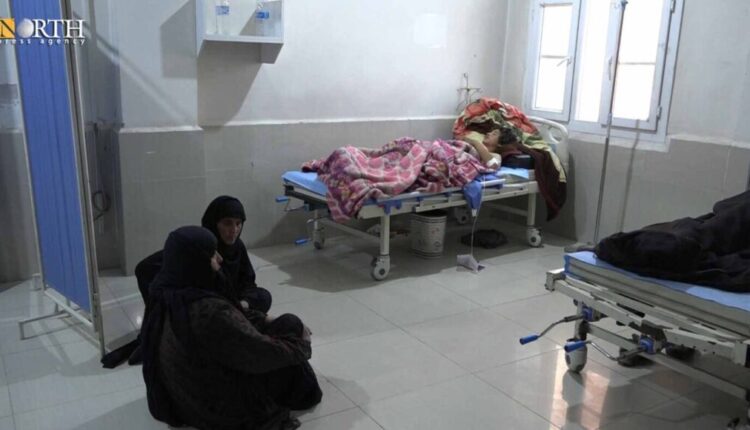
RAQQA, Syria (North Press) – While preparing dinner for her family in a tent in the vicinity of Ain Issa in the Syrian northern governorate of Raqqa, the 35-year-old Na’ima Muhammad had not taken into consideration that only few minutes would separate her from an accident that would change her life and that of her children.
Few minutes would have caused her to loss four children, who had gathered for dinner at the time, before Turkish artillery shells hit their tent, wounding the whole family.
On Tuesday night, the village of Qartaj south of the town of Ain Issa was shelled by the Turkish forces, wounding five civilians, the mother and her four children.
Unfortunately, the oldest son was hit with a piece of shrapnel in the back, causing him Hemiplegia, a condition caused by brain damage or spinal cord injury that leads to paralysis on one side of the body.
Muhammad said that she had heard the bombing sounds close to her tent, so that she tried to protect her children by fleeing the tent, but unfortunately they were all wounded in the direct shelling.
The mother described the panic and pain they had experienced during the shelling, saying that people of the region rushed to transfer them to Ain Issa and then to Raqqa National Hospital.
The family members, who moved to Qartaj a week before the shelling, are shepherds and reside in a tent.
Several families who work in grazing sheep live in tents in the village.
The Turkish forces and their affiliated Syrian opposition armed factions, known as Syrian National Army (SNA), have been pounding the town of Ain Issa and the surrounding villages in addition to other areas northern Syria since 2019.
Ain Issa is a link among the areas of Jazira, Deir ez-Zor, Raqqa, Kobani, Manbij, and Aleppo.
Though Turkey signed two ceasefire agreements one with Russia and the other with the US following a Turkish military operation against Sere Kaniye (Ras al-Ain) and Tel Abyad in 2019, areas in north and northeast Syria undergo successive shelling.
On beds in the Raqqa National Hospital, the four children and their mother are laying at the surgical unit. Each of them is sustaining wounds due to the shelling.
However, the mother has not been informed that her oldest son, who is only 13 years old, has been partially paralyzed after being hit with the piece of shrapnel.
Doctors do not want to break her heart since she keeps moving between the beds to watch her children.
“The oldest son was diagnosed with Hemiplegia because a piece of shrapnel passed through his back and lodged in the abdomen,” said Muhammad al-Ayed, a neurosurgeon in Raqqa National Hospital.
The doctor explained that they managed to remove the shrapnel during the surgery, but it harmed the spine of the child.
The health condition of the three other children, the youngest of whom is five years old, is stable, according to the doctor.
After checking their condition, the mother returns to her bed to rest because she also sustains wounds in her back and the right leg.
She wonders about the fault they made to be shelled violently, explaining that they are mere shepherds residing in tents who strive to secure their livelihood.
The 50-year-old Arna Hammoud, the children’s aunt, are sitting against the ground inside the surgical unit watching her brother’s children and their mother, trying to console them.
“The shelling took place at the time of Isha prayer. It started hitting homes, we got out, but the four children and their mother were injured,” Hammoud said.
“We have nothing to do with anything. If we had known about the shelling before, we would have stepped away from there,” she explained.
The Turkish forces and SNA factions continue to target civilians in northeast Syria. The shelling targets civilians and harms children.
On January 8, the Turkish forces targeted nine areas in Kobani and its countryside, northern Syria. The most severe attacks hit the villages of Qaramogh, Alishar, Tel Hajeb, Sarzori, Khana, Gultabah.
The four-year-old Abdo Mustafa Hanifi, who is from the village of Qaramogh, 20 km east of Kobani, had his leg amputated due to the Turkish shelling.
